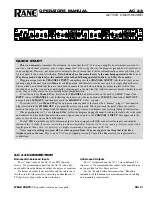
Manual-1
AC 23
ACTIVE CROSSOVER
OPERATORS MANUAL
AC 23 CONNECTION
Balanced/Unbalanced Inputs
The ¼" Input jacks on the AC 23 are TRS (tip-ring-
sleeve). We recommend connecting the AC 23 with a bal-
anced cable from the balanced output of a mixer or equalizer.
If a balanced output is not available, and the cable run is
less than ten feet (three meters), inserting an unbalanced ¼"
TS (tip-sleeve) plug works in most situations.
Unbalanced Outputs
The ¼" Output jacks on the AC 23 are unbalanced TS
(tip-sleeve). We recommend that cables to the amplifiers be
no longer than ten feet (three meters).
See the “Sound System Interconnection” RaneNote
included with this manual for more information on cabling
and grounding requirements.
QUICK START
This is an automatic crossover!
By automatic, we mean that the AC 23 is smart enough to know whether you want to
run it as a two channel crossover, or as a single channel unit. It knows by the way the plugs are inserted how your system is
to be configured. However, just because it is automatic, doesn’t mean that it will not automatically confuse you when you
try to connect it in a bench test situation.
Note: Labels
above
the controls refer to the unit being operated in the 2- or 3-
Way
Stereo
mode. Labels
below
the controls refer to the unit being operated in the 4- or 5-Way
Mono
mode.
Plugging a signal into the
CHANNEL 1 INPUT
and nothing into the
CHANNEL 2 INPUT
tells the unit that you are
running a single channel system in
Mono 4-
or
5-Way
mode, and therefore sets the unit up to be a single channel device.
This can lead one to think that there are some dead channels in the unit when looking for output in places where there
shouldn’t be any. The even more automatically confusing part is the way that the Output connectors decide whether the unit
is a 4-Way or 5-Way crossover. It is actually rather straightforward.
To test the unit as a
Mono 4-Way
, first slide the
CHANNEL 1
and
2
switches on the back to
3-WAY
. Connect the
INPUT
source to
CHANNEL 1
only. Following the labels below the jacks, look at
SUB OUT
, then look at
LOW OUT
,
now go back to
MID OUT
, and then proceed to the
HIGH OUT
. So far, so good.
To test the AC 23 as a
Mono 5-Way
, the only precaution required is there must be a “dummy” plug (¼" unconnected
plug) inserted into the
HI MID OUT
to program the crossover properly. When you reach the point where you want to
measure the output of the channel with the dummy in it, simply remove it and insert your test output plug in that location.
When operating the AC 23 as a
Stereo 3-Way
, follow the diagram on page Manual-5, reading the labels above the jacks
and controls. To drive both Channels with a mono signal, connect only to the
CHANNEL 2 INPUT
. This approach is the
same as if you used a wye cable to both Inputs.
The
AC 23B
is available as a fully balanced output version equipped with XLR connectors (for inputs and outputs)
instead of the ¼" jacks. If you are connecting to balanced amplifiers from the AC 23 or are running crossover output cable
lengths greater than 10 feet (or 3 meters), we highly recommmend you purchase an AC 23B.
Never connect anything except an RS 1 or other approved Rane AC power supply to the thing that looks like a
telephone jack on the rear.
This is an 18 VAC center-tapped power unit. Consult the Rane factory for replacement or
substitution.
WEAR PARTS:
This product contains no wear parts.



















